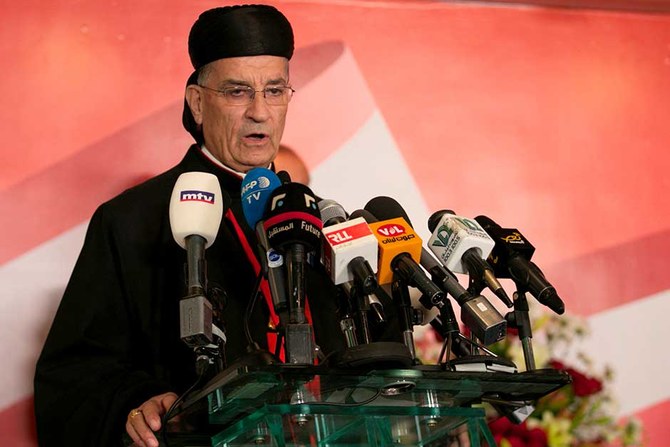BEIRUT: Lebanon’s top Christian cleric lashed out at “stubborn and destructive” officials on Sunday for blocking the formation of a new government.
Maronite Patriarch Bechara Boutros Al-Rai used his sermon to denounce those who were blocking the process, painting a grim picture of how Lebanon was struggling during the pandemic and a financial crisis.
Politicians have failed to agree on a new administration since the last one resigned after the devastating Aug. 4 explosion in Beirut. There has also been a sharp increase in tension between President Michel Aoun and Prime Minister-designate Saad Hariri.
Al-Rai led mediation efforts to resolve the deadlock and complications, but failed in his endeavors.
The patriarch fumed at “the obduracy of the officials in Lebanon in their stubborn and destructive stances for the state as an entity and institutions.”
“With what conscience, what justification, what kind of authority and right, and by whose mandate do you not form a government?” he demanded to know. “Why do you not form a government when the people are crying out from pain, starving from poverty and dying from disease?”
Hospitals were full of patients, he continued. Clinics and pharmacies lacked medicines, stores lacked food, and the monetary and economic crises had reached their climax.
“The economy is fading away, agricultural production is destroyed, people are standing at the doors of banks hopelessly begging for their money, the major military, financial and judicial state institutions are hit in their prestige, morale and officials due to programmed campaigns and malicious rumors.”
Borders had no control, there was smuggling at the country’s expense, sovereignty was incomplete, independence was suspended, corruption was rampant, and unemployment and poverty affected more than half of the population, he added. “The capital is afflicted, the port is destroyed, the wealth of oil and gas is seized and the country (has) entered the orbit of final collapse.”
His anger followed an intense period of bickering between the country’s political factions about why a government was not being formed.
Aoun said the president had a constitutional right to approve the entire Cabinet formation before signing it off, while Hariri said the problem did not lie with him but “rather with the president who objects and says that he does not approve this or that name, but does not give an explanation for his objection.”
A statement on Saturday night from the Free Patriotic Movement (FPM), led by Aoun’s son-in-law MP Gebran Bassil, attacked Hariri.
“The time of foreign tutelage has ended and it is an illusion that some are trying to replace it with internal hegemony,” it said. “This means giving up attempts to seize the political rights of any Lebanese component.”
FPM MP Cesar Abi Khalil said that Aoun would not resign and that the FPM lawmakers had not named Hariri to head the government because they did not trust him with the task required at this stage.
Insults lit up social media, with lurid comments such as “Senile Aoun” and “Berri for theft and corruption,” a reference to Lebanese Parliament Speaker Nabih Berri.
Former minister Nazem El-Khoury said that the patriarch had expressed the pain of all Lebanese people in his sermon.
He addressed the FPM, saying: “For those who claim to defend the rights of Christians, please do not be more Christian than the patriarch of the Maronites and the whole of Lebanon.”
The Lebanese daily Ad-Diyar reported on Sunday that a political and parliamentary official was concerned about “attempts to disrupt solutions in Lebanon as if there was a plot to bring down Lebanon.”
The official expressed fears that what was required was the “survival of the caretaker government headed by Hassan Diab until the end of the term.”
Diab formed his government last January to tackle the country’s worst economic crisis in decades. His administration came to office after his predecessor, Hariri, resigned in the face of mass protests.




























